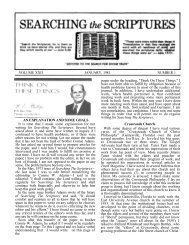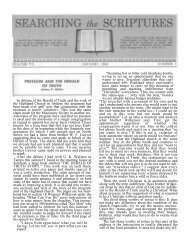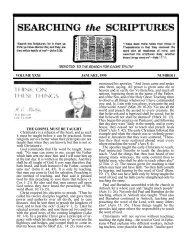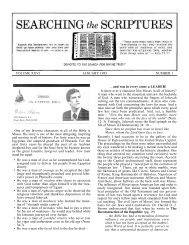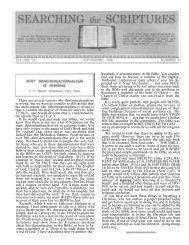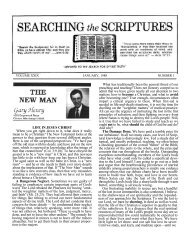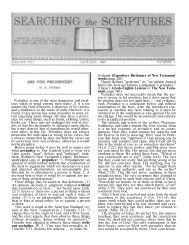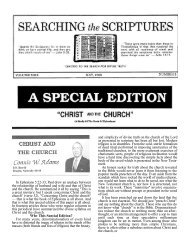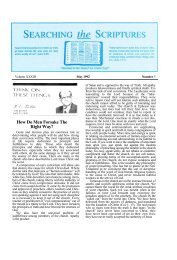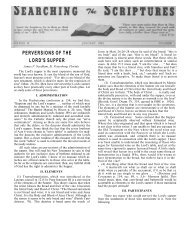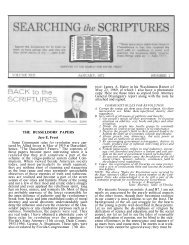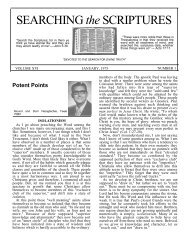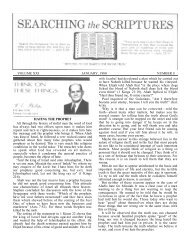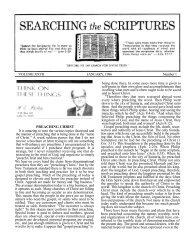Volume 18 – 1977 (PDF) - Searching The Scriptures
Volume 18 – 1977 (PDF) - Searching The Scriptures
Volume 18 – 1977 (PDF) - Searching The Scriptures
Create successful ePaper yourself
Turn your PDF publications into a flip-book with our unique Google optimized e-Paper software.
Page 6<br />
regarded as irrelevant or immaterial. <strong>The</strong>re is nothing<br />
spiritually significant about the number of times. <strong>The</strong><br />
"day" has spiritual significance—the number of times<br />
does not.<br />
It is interesting and perhaps worthy of some note<br />
that some secular scholars say there were two<br />
meetings of the early saints on Sunday in some parts<br />
of the country—a predawn meeting and a late<br />
evening meeting (See <strong>The</strong> Life And Works Of St.<br />
Paul, By F. W. Farrar). R. C. H. Lenski says in his<br />
commentary on Acts 20:7, "We, indeed, think that a<br />
morning service was held at Troas on this Sunday<br />
although no mention of it is made by Luke." William<br />
Barclay says, "We see that all this happened at<br />
night. That is probably so because it was only at<br />
night, when the day's work was done, that slaves<br />
would come to the Christian fellowship." After all,<br />
Christianity is flexible enough in the realm of things<br />
generically authorized to adapt itself to the existing<br />
social conditions of the long ago as well as to the<br />
present hour.<br />
Two more passages must be considered: 1 Cor.<br />
11:7-34 and 1 Cor. 10:16, 17. In the former, two<br />
wrongs are identified: 1) Division, which is illustrated<br />
by their separate observance. 2) <strong>The</strong>y observed it<br />
unworthily, which is illustrated by their excess or by<br />
making a gluttonous feast of their observance. To use<br />
verse thirty three, "tarry one for another," to<br />
condemn separate observance for some reason other<br />
than division and a sectarian spirit is to misuse the<br />
word of God. If we were to apply other passages<br />
as loosely, we would have to condemn giving,<br />
praying, and fasting that is done in the presence<br />
of others (Matt. 6:1, 5, 16). However, a more<br />
careful examination shows such to be wrong only<br />
when improperly motivated, namely, "to be seen of<br />
men." So it is with 1 Cor. 11:33. <strong>The</strong> separate<br />
observance condemned relates to division and a<br />
sectarian spirit.<br />
In 1 Cor. 10:16, 17 Paul says, "<strong>The</strong> cup of blessing<br />
which we bless, is it not the communion of the blood<br />
of Christ? <strong>The</strong> bread which we break, is it not the<br />
communion of the body of Christ? For we being many<br />
are one bread, and one body: for we are all partakers<br />
of that one bread." To conclude that the communion<br />
of these verses is limited to a local<br />
congregation—hence, the need for the whole body<br />
jointly participating in one service is to miss the<br />
point made on communion. Paul wrote from Ephesus<br />
to the saints in Corinth and to "All in every place<br />
. . ." (1 Cor. 1:2; 11:17, 16:8). Note: "the cup ...<br />
. . . which WE bless;" "the bread which WE break;"<br />
"WE ... are one bread, and one body: for WE are<br />
ALL partakers of that one bread" (Emphasis MEP).<br />
Thus, Paul, the saints at Ephesus, and the saints at<br />
Corinth—all were one bread and one body and did<br />
jointly partake (have communion) wherever and<br />
whenever they properly observed the Lord's supper,<br />
whether in one or one hundred assemblies.<br />
BRINGING HIM UP RIGHT<br />
I was recently looking through clippings I had<br />
collected over the past year (while trying to clean off<br />
my desk) and I ran across one interesting article from<br />
<strong>The</strong> Tennessean, July 2, 1976. It's headline reads:<br />
Preacher's Wife Has 6 Children and a Copperhead.<br />
<strong>The</strong> lady's name is Nellie Pack. She lives near<br />
Newport, Tennessee. And she keeps a poisonous<br />
snake in a wooden box of dirt atop her refrigerator.<br />
She doesn't like the snake, "I'm scared to death of<br />
them," she said. "I can't even pick up one of those<br />
red worms when we go fishing." Yet when she "feels<br />
the power of the Lord" she is able to put her hands<br />
into the box full of "wriggling, writhing,<br />
copperheads, rattlesnakes, cobras and cottonmouths."<br />
In one service, she picked up eight deadly snakes<br />
at once.<br />
<strong>The</strong> Packs (her husband is "pastor" of the Holiness<br />
Church of God in Jesus Name) both believe the Bible,<br />
in Mark 16:<strong>18</strong>, directs true believers to "take up<br />
serpents."<br />
<strong>The</strong>y also believe they can drink "any deadly<br />
thing" and "it shall not hurt them." Liston Pack's<br />
faith wasn't shaken when his brother Buford died in<br />
1973 after drinking strychnine at services in the little<br />
backwoods church. Liston had a bad experience with<br />
the strychnine too, but he ascribes that to not being<br />
anointed by the spirit strongly enough.<br />
What can we say of such Bible ignorance? We<br />
might say these folks are at least more consistent<br />
than their more sophisticated Pentecostal neighbors.<br />
If the signs Jesus promised His disciples in Mk.<br />
16:17-20 are still in force today, then all of us had<br />
better cast more than a sympathetic glance at the<br />
Packs!<br />
Pentecostals often argue that the "serpents" of this<br />
passage are false teachers. <strong>The</strong>y are to take "false<br />
teachers" up in the sense of refuting their teaching.<br />
If so, I would think the "deadly poison" would<br />
necessarily be false doctrine! <strong>The</strong>y are commanded to<br />
drink it!<br />
<strong>The</strong> sad thing is, they have done just that!<br />
<strong>The</strong> article on the Packs closes with a description<br />
of little David Pack, the youngest of the six children,<br />
playing with a garter snake. I suppose they're<br />
bringing him up in the church.<br />
If It Feels Good . . .<br />
<strong>The</strong> "new morality" is epitomized by the bumper



